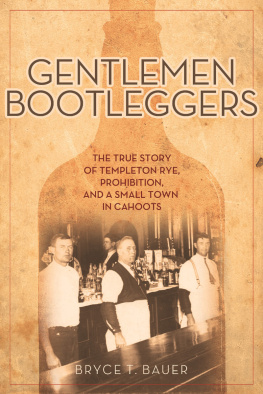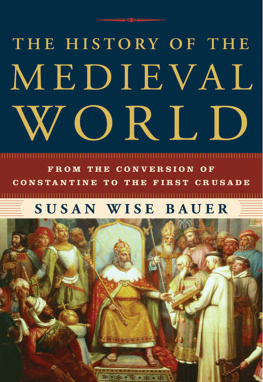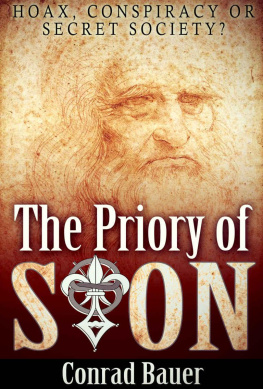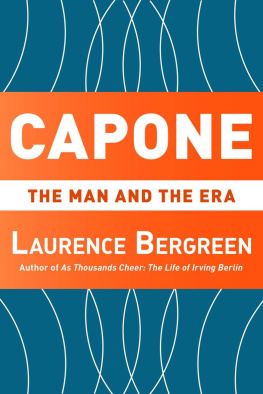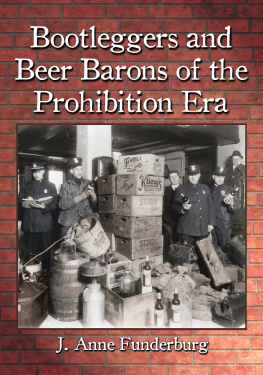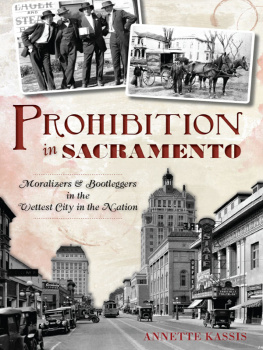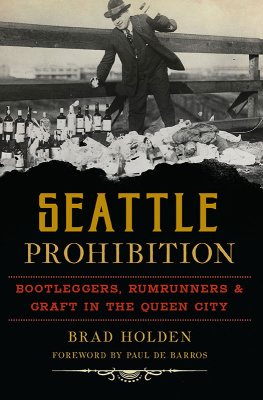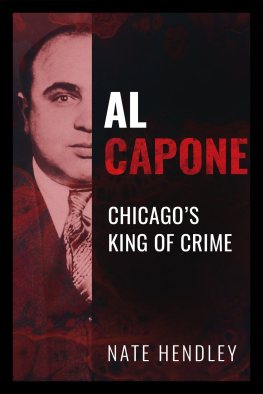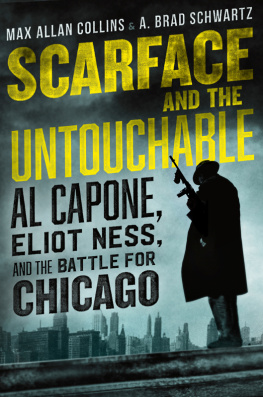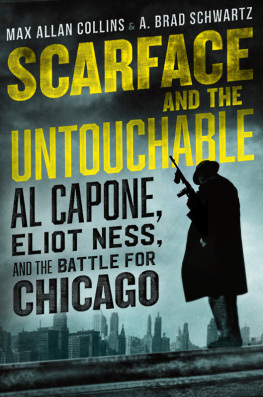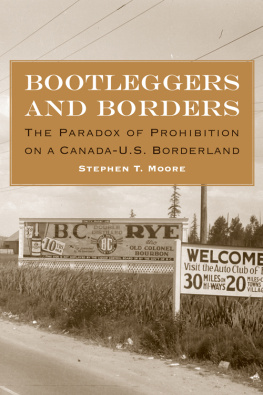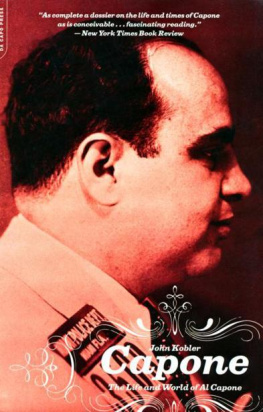D uring Prohibition, while Al Capone was rising to worldwide prominence as Public Enemy Number One, the townspeople of rural Templeton, Iowapopulation just 428were busy with a bootlegging empire of their own. Led by Joe Irlbeck, the whip-smart and gregarious son of a Bavarian immigrant, the outfit of farmers, small merchants, and even the church monsignor worked together to create a whiskey so excellent it was ordered by name: Templeton rye.
Just as Al Capone had Eliot Ness, Templetons bootleggers had as their own enemy a respected Prohibition agent from the adjacent county named Benjamin Franklin Wilson. Wilson was ardent in his fight against alcohol, and he chased Irlbeck for over a decade. But Irlbeck was not Capone, and Templeton would not be ruled by violence like Chicago.
Gentlemen Bootleggers tells a never-before-told tale of ingenuity, bootstrapping, and perseverance in one small town, showcasing a group of immigrants and first-generation Americans who embraced the ideals of self-reliance, dynamism, and democratic justice. It relies on previously classified Prohibition Bureau investigation files, federal court case files, extensive newspaper archive research, and a recently disclosed interview with kingpin Joe Irlbeck. Unlike other Prohibition-era tales of big-city gangsters, it provides an important reminder that bootlegging wasnt only about glory and riches, but could be in the service of a higher goal: producing the best whiskey money could buy.

T O THREE GREAT MEN:
Vic Bauer, Chuck Manatt, Louis Lauritsen
Copyright 2014 by Bryce T. Bauer
All rights reserved
Published by Chicago Review Press Incorporated
814 North Franklin Street
Chicago, Illinois 60610
ISBN 978-1-61374-848-0
Library of Congress Cataloging-in-Publication Data
Is available from the Library of Congress.
Interior design: Jonathan Hahn
Map design: Chris Erichsen
Printed in the United States of America
5 4 3 2 1
CONTENTS
Index

JUNE 16, 1931
On June 16, 1931, two bootleggers, both notorious violators of the decade-old National Prohibition Act, which enforced the Eighteenth Amendments ban on alcohol, fled two different federal courtrooms in a hurry. One hailed a taxi and slid into the backseat as a swarm of spectators thronged inches away; the other sped away in his Ford Model T, trailed by no one.
Their destinationslike their experiences, the shape of their fame, their individual fatescould hardly have been more different. Al Capone, the man in the cab, wended through the clogged, cacophonous streets of downtown Chicago on the way to his splendid floor of suites at the Lexington Hotel. There, the next day, he could pick up the morning newspapers and see his name splayed across the front page, column inches dripping away below, full of paeans to his imminent downfall.
Joe Irlbeck, meanwhile, bounced along the dusty, gully-cut roads of western Iowa. He was headed toward his home in the tiny town of Templeton, Iowa, in the county where he had lived his entire life, Carroll. There he was encircled by neighbors who knew him by name, by sightas they knew everyone in the surrounding countryside. Some of them were grateful for what hed done for their community, others perhaps a bit intimidated, a few maybe even disdainful, but still they all supported him. When his crimes hit the paper, the stories were met with amazement more than scorn.
Both bootleggers were about the same age, and though they didnt know each other, they were united. Their last several years had beenand the rest of their lives would bedefined by opposition to the Eighteenth Amendment, the only amendment to ever restrict the freedoms of every citizen.
Its supporters, the drys, were a motley but fierce band of traditional Americans: largely white Protestants, men and, significantly, women, whose ties to America went back generations and who were intensely loyal to the countrys English heritage. Some were businessmen, others clergy, yet others professional activists. Politicians were among them, of course. But there were also those whod never before worked in the public sphere. They werent all residents of rural America, but it was the values associated with rural America that defined them, that they held dear, that they sought to protect from the sullying effects of alcohol and alcohols supporters, the wets.
The wets were an even more assorted group, defined, roughly, as everybody the drys were not: Catholic or Jewish, urban and immigrant. To them, Prohibition was nothing but a heavy-handed attempt to legislate morality and an un-American folly. The drys claim that an era without alcohol would be one of newfound prosperity, in which men would behave as saints and women and children could live in peace, abundance, and godliness, seemed absurd. In the end, the wets would be vindicatedProhibition would prove to be the most charlatan of laws, one that led the country into temptation and delivered it to evil. But it endured far longer than the wets had predicted. With a century of momentum behind it, repealing it would not be easy. And as long as it remained in effect, the government was obligated to enforce it, no matter how hopeless the fight against its violators appeared to be.
Of medium height and average build, with gray eyes and black hair, Joe Irlbeck nonetheless stood out. His oval face could cut a penetrating stare or a knowing, warm smile. He possessed the attitude of a bartender: companionable, but stern when necessary. He was ambitious and intelligent enough to fulfill his aspirations.
Born in December 1899, he was just eleven months younger than Al Capone. He grew up on a farm near Dedham, seven miles east of Templeton, one of eleven children. His father, like so many early settlers in Carroll County, had been born in Germany, in Bavaria, and came to the newly opened land of western Iowa to find a comfort and safety that was all too elusive in his homeland. Though he found it, the prospect wouldnt last through the second generation. As luck would have it, however, Joe Irlbeck came of age just as a vast new market was opening up: that for illicit alcohol. (Enacting Prohibition, as one astute politician rightly predicted, was tantamount to legalizing the manufacture of intoxicating liquor without taxation.) He jumped right in.
At a time when asking the provenance of a particular shot of liquor was as absurdand embarrassingly naiveas asking the origin of the pork in the sausage that rolled off the belts at Swift & Co.s sprawling processing plant on Chicagos South Side, the whiskey Irlbeck came to make, Templeton rye, managed the remarkable: it established itself as a brand. Newspapers quoted its price independent of other bootleg liquor and discerning buyers ordered it by name.
By 1931, Irlbecks operation had grown into a sprawling organization capable of producing hundreds of gallons of booze, worth thousands of dollars, a day. To achieve that required the involvement of nearly every one of Templetons residents, from the town grocer to the church monsignor. As a result of their volume, the quality of their product, and their total commitment to bootlegging, Templeton, population just 428, became known as the far-famed oasis of the middlewest.
But that same success drew the attention of the federal Prohibition agents charged with cracking down on violators. Leading them was a former blacksmith and sheriff named Benjamin Franklin Wilson, the most respected Prohibition agent in the state. Born in Audubon County, just south of Carroll County, he was familiar with the area.
Next page
